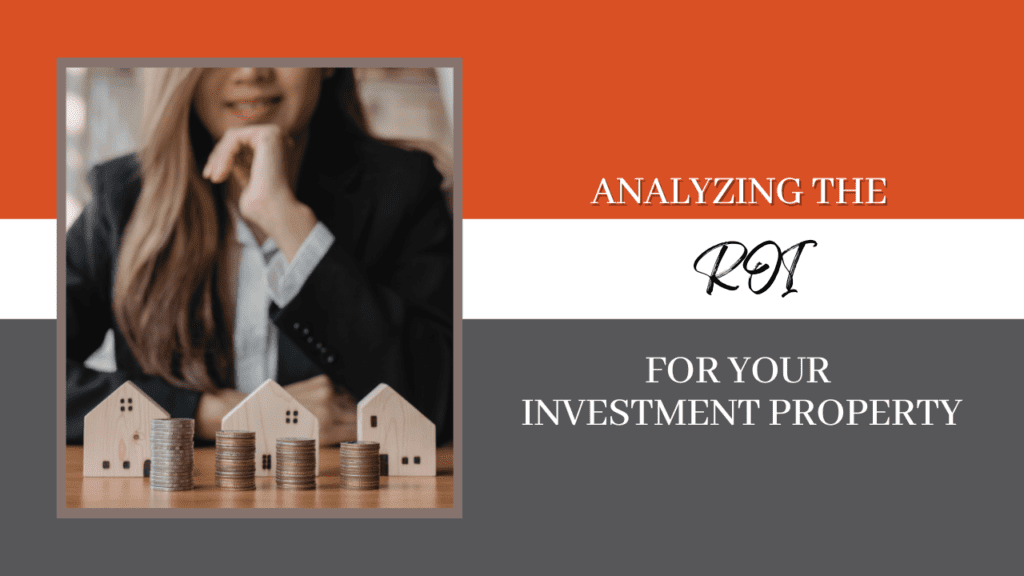
Whether you own an investment property in Pocatello or you’re thinking about buying one, it’s important to understand the return on investment, or ROI, that you’re earning or have the potential to earn. This will tell you how profitable your investment is, and whether you’ve made the right choice.
The problem is, ROI often means different things to different people. Are we talking about capitalization rate or cash-on-cash return? Some investors use the internal rate of return to determine their ROI. For others, it’s as simple as looking at cash flow or appreciation.
To analyze your own ROI, you’ll have to define your investment goals, decide whether cash flow or appreciation is your ultimate goal, and then do some simple math to calculate your actual ROI.
We can help. We work with investors all the time on deciding what success looks like, how to measure ROI, and whether changes need to be made to ensure there’s a higher return on the investment that’s been made. Sometimes, refinancing can be a great tool to increase ROI (although not at the moment). Other times, investing in upgrades and improvements can boost your rental value and increase the amount that you’re earning in the short and long term.
We have strategies, and the strategies that work best for you will depend on your unique investment goals and plans for the future.
Let’s talk about how to analyze the ROI for your Pocatello investment property. This should be an ongoing conversation between you and your property manager.
Defining Your Pocatello Investment Property Goals
First, to understand what kind of return you’re earning on your investment, you have to decide what’s important to you, and how you’ll experience success. Talk to us about whether you’re investing for cash flow, appreciation, or both.
- Cash flow. If cash flow is your major concern, you’ll want to make sure your rental income can cover all fixed and variable expenses, including mortgage payments, tax liability, interest on your loan, maintenance, property management, vacancy, and other expected and unexpected costs.
These things must be accounted for before you earn any rental income. The income generated above and beyond all expenses is called cash flow. It’s basically your profit that you’re earning every month when rent is paid.
- Appreciation. If you’re investing for appreciation, you’re buying with the expectation that your asset will increase in value during the period that you own it. Most of your money will be made when you sell it in five years or 10 years or whenever. If this is your investment goal, what you earn in the short term or on a month-to-month basis won’t be quite as important to you as the equity you’re building and the value that’s growing.
In your best-case-scenario, your Pocatello investment property, whether it’s a single unit or an entire building or a portfolio of investment properties, will earn both positive cash flow and provide appreciation potential.
These are some of the ways we can measure and analyze your ROI.
How to Analyze ROI on Pocatello Investment Properties: Cash Flow
If cash flow is your major reason for owning a rental property or a building in Pocatello, we can help you with some math that makes it easy to analyze what you’re earning.
It can be as simple as this: add up all the expenses and then subtract that number from your rental income. The result is hopefully positive and not negative. That’s your cash flow and it reflects your short-term ROI.
For example, on a Pocatello unit that you’re renting out for $1,500, you may have the following monthly expenses:
Mortgage: $800
Property taxes: $150
Insurance: $120
Property management: $120
Vacancy reserves: $60 (5% of rental income, adjustable)
Repair reserves: $120 (10% of rental income, adjustable)
Your monthly expenses based on this example are $1,370. Subtract that from your $1,500 rental income and you have a cash flow of $130 per month.
How to Analyze Your ROI for Appreciation
Appreciation is pretty literal. It’s defined as the increase in the value of your property from the time you purchased it to the time you intend to sell it.
The Pocatello rental market is attractive to investors because when done correctly, it’s possible to earn both cash flow and appreciation. If you’re earning $130 a month according to our example above, appreciation is like a bonus.
A lot of investors don’t think about what their property is worth until they’re ready to sell. Most are focused on the rental income and the fixed expenses every month. If your Pocatello property value rises and falls a little bit every year, you’re likely not going to agonize over it.
Pocatello investment properties are growing in value. Check in on an annual basis and you can expect an increase of several percentage points every year.
Here’s the thing: It would be outstanding if every property you purchased began to earn you money on month one. If the amount of rent you collect far exceeds the amount you need to spend on that property, you’re going to earn a lot of rental income.
But, that’s unlikely.
Capital appreciation is the increase of a home’s market value compared to its purchase price or acquisition cost. When you factor appreciation into your investment strategy, you’ll see that it will help you earn the income you’re hoping for as the property increases in value. Pocatello real estate values are going up, and they will likely continue to increase. It’s a great market with a lot of room for appreciation.
Let’s Talk Metrics: Cash on Cash, Cap Rate, Internal Rate of Return and other Metrics
When you really want to drill deep into an analysis of the ROI you’re currently earning or could be earning, you’ll need to take your specific numbers and plug them into any number of formulas that real estate investors use.
- To determine your cash on cash return, for example, you’ll need to take your annual cash flow and divide it by the amount you paid out of pocket for your property.
- To get your capitalization rate, you’ll need your net operating income (NOI), and you’ll be less concerned with the cash you paid during the acquisition and more concerned with the purchase price of the property.
- The internal rate of return measures the rate of return earned on an investment during a specific and defined period of time. To analyze your ROI using the internal rate of return, you’ll measure your net cash flow and anticipated appreciation against the number of years you expect to own the asset.
You can choose the formula that works best for you, or you can talk to us about how to best analyze and measure the ROI you’re earning on your property or your entire portfolio. It does not have to feel like guesswork.
Other Ways to Think about Your ROI
Cash flow is important. Appreciation and equity are important. However, you need to remember that you’re making money in a myriad of ways when you buy and hold residential real estate. This is a tangible asset that you have almost complete control over.
Here are some other things that impact what you earn:
- Depreciation and Tax Benefits
It’s easy to think only about the money that’s flowing in, but you also have to consider what you’re earning by taking advantage of tax breaks and especially depreciation.
You’ll need to declare all the income you earn off your rental property, but you can offset that income with any expenses related to your rental home. These may include maintenance costs, legal and accounting fees, property management fees, mortgage interest, and any travel expenses related to visits you made to your property
There are several others, and we encourage you to speak with your CPA or tax accountant to get an idea of what you should be deducting to limit your tax liability.
Depreciation allows you to deduct the investment and purchase costs of your rental property. Even better, you get to take this depreciation over the life of the investment instead of just in the year you purchase it. Currently the IRS has an average lifespan of 27.5 years on record for a home, so that’s the number you’ll use in your tax planning.
This contributes to your ROI.
- Upgrades and Improvements
You also have an opportunity to increase ROI by making your investment property more valuable. When you make cost-effective renovations that increase property value, reduce vacancy, and attract better tenants, you’re increasing the value of your investment. You can analyze these earnings by looking at what you invested to make the repairs and then how much it raised your rent or helped retain a resident.
 Analyzing your ROI is an important way to make smart investment decisions. We can help you look at what you’re earning and what you’d like to earn. When it’s time to analyze where you are, please contact us at Jacob Grant Property Management. We provide property management help and investment advice in Idaho Falls, Pocatello, and the surrounding areas.
Analyzing your ROI is an important way to make smart investment decisions. We can help you look at what you’re earning and what you’d like to earn. When it’s time to analyze where you are, please contact us at Jacob Grant Property Management. We provide property management help and investment advice in Idaho Falls, Pocatello, and the surrounding areas.
